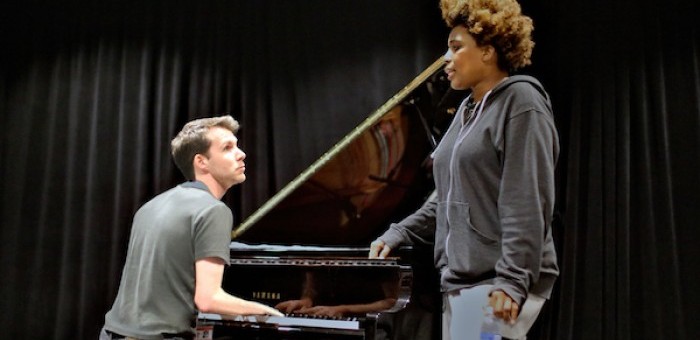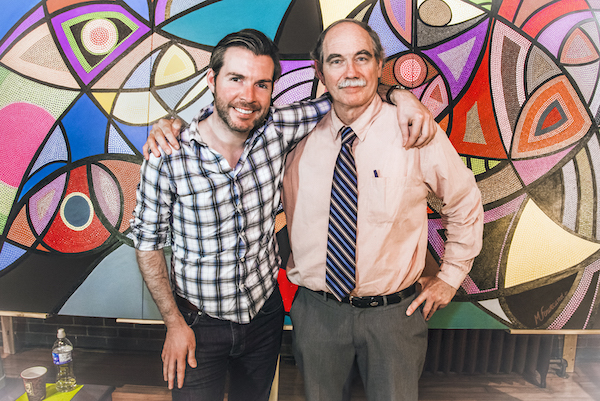Dec 9, 2025 12:28 PM
In Memoriam: Gordon Goodwin, 1954–2025
Gordon Goodwin, an award-winning saxophonist, pianist, bandleader, composer and arranger, died Dec. 8 in Los Angeles.…

Gwilym Simcock at Hyatt jam session with Macy Gray, Montreal, 2013.
(Photo: Michael Jackson)Despite a formidable reputation in the U.K. and Europe and extensive touring with Anglo-American supergroup The Impossible Gentlemen (which originally included U.K. guitar great Mike Walker, bassist Steve Swallow and drummer Adam Nussbaum and currently features Walker, bassist Steve Rodby and keyboardist/reedist Iain Dixon), pianist Gwilym Simcock is little known on the North American continent. Yet the globally savvy Montreal Jazz Festival has been hip to the Welsh boy wonder (now in his mid-30s) even before he joined Pat Metheny’s group, and the fest booked him to play solo once more this July, four years after his Montreal fest debut.
“It was a thrill to return to Montreal again,” said the likable, gracious Simcock, “A privilege to play a solo concert for the extremely knowledgeable crowd at the festival.”
This solo tour came after roughly seven weeks on the road with Metheny, Simcock’s fifth tour with the quartet. “We’ve been playing many of (Metheny’s) classic tunes in the concerts, which is especially a treat for myself, as his music was majorly responsible for getting me into jazz in the first place,” stated the pianist, who originally studied classical forms (plus French horn and composition) at the U.K.’s prestigious Chetham’s School of Music in Manchester and at Trinity College London before distinguishing himself at the Royal Academy of Music, where he is professor of jazz piano. “We’ve recorded a new album as a group which will hopefully be out next year, and I’m really excited and honored to be part of [Metheny’s] legacy of recorded music that has been such a huge part of so many jazz fans’ lives.”
Both of Simcock’s Montreal visits have been as a soloist, and the first was far from ideal (due to flight delays, he arrived over an hour late for his set at Cinquième Salle). Unable to wind down after his performance on that occasion, Simcock re-ignited the jam session, then held at the Hyatt, and threw down with local singers well past 3 a.m., ultimately duetting with Macy Gray on a touching version of “God Bless The Child.”
Although on stage at Salle Ludger-Duvernay at the Monument National on July 3 this year, Simcock claimed he’d had an easier commute—he’d set off that morning from Toledo, Ohio, at 4 a.m. He commenced with “Every Time We Say Goodbye,” noting it was a “strange one to start with.” He followed with his “old-fashioned” original “Royalty” (he met Queen Elizabeth at a Diamond Jubilee bash at the Royal Academy and is a fan).
Simcock’s playing has an iridescent quality; dense harmony and rhythmic surety allied to classical training lends it poise and gravitas. His improvisation on the adagio movement of Edvard Grieg’s singular piano concerto (he only wrote one) exhibited the crystalline, halting touch of Keith Jarrett and indicated that, for all his chops, Simcock has that attribute, not so common in jazz, to significantly rein in licks and let the mood exquisitely resonate (to hear an earlier incarnation of this, check the double CD Blues Vignette on the Basho label from 2009). Simcock then telescoped back via his five-year stretch with Bill Bruford’s Earthworks, with which he is connected, by osmosis, to prog rockers King Crimson (Bruford served three terms with Crimson in the ’70s, ’80s and ’90s).
As he shared the piece “A Kind Of Red,” composed for the Delta Saxophone Quartet’s tribute Crimson! (Basho, 2016), Robert Fripp’s latest incarnation of the epochal band was midway through a marathon three-hour show at the close by Salle Wilfrid-Pelletier.
As self-confessedly “chunky” as Simcock’s left hand was on acoustic piano bolstering a Crimson-esque groove, one looks forward to him assembling an ensemble configuration for the festival next visit, as the breadth and clarity of his scoring for a variety of instrumental and choral formats is outstanding. The cruciate ligament in his right thumb, incidentally, was once torn playing soccer, so Simcock played left-handed for several months, strengthening that aspect of his technique. Perhaps to woo Canadians, there followed a blithe rendition of late ex-pat Toronto genius Kenny Wheeler’s waltz “Everybody’s Song But My Own”—a nice vehicle for the Welshman’s own harmonic sensibility, since it seesaws between two keys.
Simcock introduced one of his final pieces with a playground refrain, describing how he bashed it out one time on a junk piano in London’s Dalston neighborhood, accompanying a contemporary dance duo (part of a City of London Festival initiative that placed fifty pianos in various locations about the city for public use). According to Simcock, that al fresco concert had its trepidations since a posse of drunken locals gathered menacingly around the battered upright. When Simcock was about to leave, a member of this inebriated audience leaned into the car window and warned “When you come to East London, don’t ever do that again!”
The following Montreal morning, bright and early, Professor Norman Cornett hosted Simcock for a “dialogic” workshop (Kurt Rosenwinkel and Jane Bunnett were other MJF participants) at the Red Roof Church on Avenue du President Kennedy.
Cornett, a passionately intense theologian and philosopher whose mantra is “Since when do we divorce the right answer from an honest answer?” preps these workshops by playing select tracks by a given artist to blindfolded lay listeners (those with little or no prior knowledge of the chosen musician). At the workshop, the artist is then privy to the unfiltered written responses.

Gwilym Simcock with Professor Norman Cornett at Red Roof Church, Montreal (painting by M.Fourcand), 2017
The first track they were subjected to was “Mezzotint” a densely layered, shimmering composition from Simcock’s solo album Good Days At Schloss Elmau (ACT, 2011) which was recorded in Bavaria on a tasty Steinway D at a celebrated cultural retreat with a view of the Wetterstein mountains. The latter information was salient as several blindfolded listeners commented that they conjured “mountains” when listening to the track. Such uncanny revelations have proved quite the norm during these workshops, where Cornett insists “the only wrong question is the unasked question.”
With that said, question time was offset by a moving, transparent testimony by Simcock, who went back to the beginning of his training in music, discussed his personal emphasis on harmony and the mixed blessing that is perfect pitch—how it essentially lays out the score in his mind’s eye, making him unusually critical of any music casually heard. More poignantly, he mentioned how he suffered stultifying anxiety as a result of the competitiveness of classical performance, where the challenge to memorize lengthy pieces and render the same dots more profoundly than other pianists meant constant pressure. Bassist Steve Berry proved revelatory to his development as a jazz musician, when Berry visited Chetham’s offering improv classes for classical scholars.
Rather than the beboppers, it was the likes of Jarrett, Metheny and Egberto Gismonti that caught Simcock’s ear formatively, because of their expansive sound, freedom of expression and an emotional element. Simcock confessed cracking in the attempt to internalize the 25 pages of Gershwin’s Rhapsody in Blue, which he challenged himself to do for a performance, ultimately experiencing a creative breakthrough by navigating the structure without slavish adherence to the manuscript. His insecurities hark back to a childhood concert when he got lost in the middle of a Bach recital, made a second attempt, failed again and had to leave the stage with his tail between his legs.
Such stories of stage fright seem preposterous to anyone who has witnessed Simcock perform, given the remarkable accuracy and precision of his playing and his aura of calm charm. An attendee at the workshop questioned whether the absence of nerves might actually have a detrimental effect on preparation levels or perhaps compromise urgency of execution, after Simcock described how anxieties caused buffering of brain function and focus. Meanwhile Cornett read out with nuanced emphasis more responses to “Mezzotint,” such as “It feels like a massage therapist releasing a knot”; “Sounds like a gurgling river in a canyon or whirlpool”; “A tether to my purple cloud”; and “The perfect balance of manliness and tenderness,” which won a smile from the dialogic honoree.
The eponymous cut from Good Days had also been put to the test and several respondents thought the track was substantially lengthier that it was, others much shorter. “I thought it was five days long!” joked Simcock, mimicking a listener who may have wished it was briefer.
The track that blew a few blindfolded minds was Simcock’s audacious orchestration “Industrial (For Alan),” which features the City of London Sinfonia plus Russian bassist Yuri Goloubev and drummer Martin France. The song, from Instrumation (ACT, 2014), is a schizophrenic 10-minute tour de force, collaging mobile symphonic soundwalls, mechanized beats and jazz and classical elements colliding, just dodging each other, or coexisting. One dialogic respondent referred to as “Babette’s feast for the ears.”
With typical candor Simcock revealed that it didn’t take so long to record but months to edit and assemble in post, explaining that it was written for his father, Alan, who was always fascinated with factories, steam engines and mechanized transportation. His dad would often take him to preserved railways sites and industrial locations when he was a kid, so he wanted the music to shunt like a sophisticated, well-oiled machine. To those of us who have only heard Simcock in intimate contexts it gives notice of the considerable expanse of his vision and versatility.
At the close of the workshop, Cornett mentioned with some melodrama that his own father was a train enthusiast and how he was moved as a child by the rousing music of Rachmaninov’s second concerto played by Eileen Joyce, featured in a David Lean movie set at a rail station. With that he concluded that the assembled had been fortunate to experience their own “brief encounter” with Simcock and that it had been, true enough, one of unusual depth and honesty. DB

Goodwin was one of the most acclaimed, successful and influential jazz musicians of his generation.
Dec 9, 2025 12:28 PM
Gordon Goodwin, an award-winning saxophonist, pianist, bandleader, composer and arranger, died Dec. 8 in Los Angeles.…

Belá Fleck during an interview with Fredrika Whitfield on CNN.
Jan 13, 2026 2:09 PM
The fallout from the renaming of the John F. Kennedy Center for the Performing Arts to include President Donald…

Peplowski first came to prominence in legacy swing bands, including the final iteration of the Benny Goodman Orchestra, before beginning a solo career in the late 1980s.
Feb 3, 2026 12:10 AM
Ken Peplowski, a clarinetist and tenor saxophonist who straddled the worlds of traditional and modern jazz, died Feb. 2…

The success of Oregon’s first album, 1971’s Music Of Another Present Era, allowed Towner to establish a solo career.
Jan 19, 2026 5:02 PM
Ralph Towner, a guitarist and composer who blended multiple genres, including jazz — and throughout them all remained…

Rico’s Anti-Microbial Instrument Swab
Jan 19, 2026 2:48 PM
With this year’s NAMM Show right around the corner, we can look forward to plenty of new and innovative instruments…